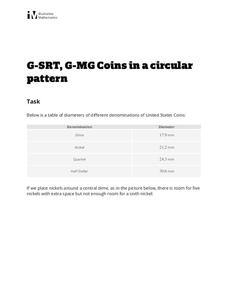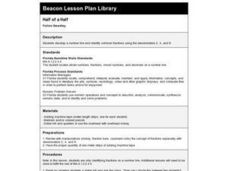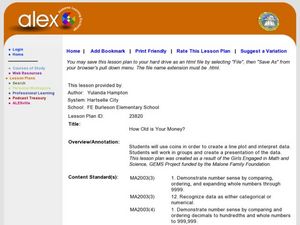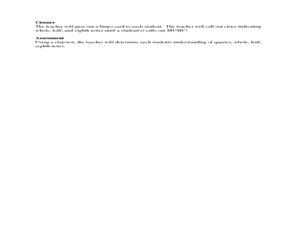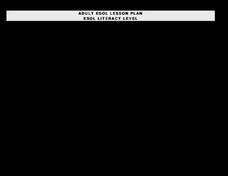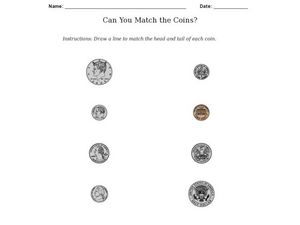Teacher Created Resources
How to Calculate Discounts and Sales
Teach discounts and sales with a straightforward worksheet. After reviewing the concept, pupils solve word problems related to dollars and percentages. The second half of the sheet prompts learners to continue solving problems related to...
Curated OER
Clean up the Money!
In this money worksheet, learners fill up a grid with coins and then roll dice to get ordered pairs and take the money of the ordered pair that they roll. Students then add up their money in the end and see who wins.
Curated OER
Counting Coins
For this counting change worksheet, students count the values of nickels, dimes, quarters, and half dollars to determine the total amount of each group of coins. Students solve 6 problems.
Scholastic
Mega-Fun Fractions
Creative and fun lessons help kids get some hands-on experience with fractions. The resource includes 50 innovative ways to teach kids about equivalent fractions, adding and subtracting fractions, using fractions in money math and...
Curated OER
Adding Decimals
Explore the practical uses of adding numbers with decimals as scholars add measurements and money. The first 12 equations are written vertically with half the sums requiring a dollar sign and half a unit of measurement. The next six are...
Curated OER
Stamping Coins
Learners demonstrate that they can use a variety of coin combinations to make a single amount. They study all the ways to make 50 cents using coins using different coins.
Curated OER
Musical Note Value
Students will identify each symbol by sight stating the value of each. They will use cardboard notes to who what they have learned so far about the note values creating 4 and 6 count phrases.
Curated OER
Fractions Problems
What a great way to explore fractions! Learners answer a series of questions related to three word problems involving fractions. They are required to use a diagram to describe their results.
Curated OER
Tick Around the Clock
Young scholars examine and discuss the differences between clocks they are shown. Using the internet, they research how people used to tell time before clocks. They review what the long and short hand on the clock represent and practice...
Texas Commission on the Arts
The Quarter Fold
Little ones identify the US quarter and explore the concept of one-fourth or one-quarter. Using real coins or coin manipulatives, they divide a square piece of paper into quarters, discuss halves and quarters, and create a design that...
Illustrative Mathematics
Coins in a Circular Pattern
What starts as a basic question of division and remainders quickly turns abstract in this question of related ratios and radii. The class works to surround a central coin with coins of the same and different values, then develops a...
Curated OER
Half of a Half
After your math classes have been introduced to fractions (especially those with denominators of two, four, and eight), introduce them to fractions on a number line with this lesson. Using a meter length of tape, show your class where...
Curated OER
Musical Change
Young learners record observations about different coin denominations and create a song about coins to the traditional song, "The Wheels on the Bus." This lesson plan is based on the Tennessee Quarter Reverse, and has all sorts of...
Curated OER
Equivalent Fractions 1
In this mathematics worksheet, 5th graders shade parts of a pie circle to illustrate the fraction given for each. Then they write the equivalent fractions for each and split them in half. Students also identify how many pieces each is...
T. Smith Publishing
Common Measures
Try introducing this assigment on converting measurement by presenting a scenario: "Last night I found a recipe for cookies, and it called for a half pint of butter. All I had was measuring cups - what should I do?" As learners discuss...
Curated OER
Two-Step Problems and Money Concepts
Elementary schoolers solve two-step equations and practice money concepts. They solve multi-step addition and subtraction contextual problems and apply money concepts to real life situations. Pupils use pictures and counters to help them...
Alabama Learning Exchange
How Old is Your Money?
Elementary learners explore coin mint dates. First, they listen to the book Alexander Who Used to be Rich Last Sunday by Judith Viorst. They then sort a collection of coins according to their mint date and put them in order from oldest...
Curated OER
Fractional Parts of a Number
In this fractional parts of a number worksheet, students read and solve 6 story problems that pertain to fractional parts of a whole number.
EngageNY
The Difference Between Theoretical Probabilities and Estimated Probabilities
Flip a coin to determine whether the probability of heads is one-half. Pupils use simulated data to find the experimental probability of flipping a coin. Participants compare the long run relative frequency with the known theoretical...
Curated OER
Visualization of Rhythms in 4/4
First graders investigate musical notes. In this music lesson, 1st graders discuss the values of each note by counting the beats accordingly.
Curated OER
Can You Compose?
Fourth graders investigate musical notes. In this music lesson, 4th graders compose a short song while clapping the rhythm and singing the syllables using the appropriate notes or rests.
Curated OER
ESOL: Time and Money
Students study the parts of an analog and digital clock. They create paper clocks to identify telling time to the hour, half-hour, and quarter past and quarter after. They practice tellng time in pairs.
Curated OER
Can You Match the Coins?
In this early childhood identifying coins worksheet, students match the heads of the 5 coins to tails of the coins. A dime, half-dollar, quarter, penny, and nickel are included
Curated OER
Can You Match the Coin's Name?
In this consumer math learning exercise, students draw a line between each matching coin and its name. They match the words penny, nickel, quarter, dime and half dollar.












